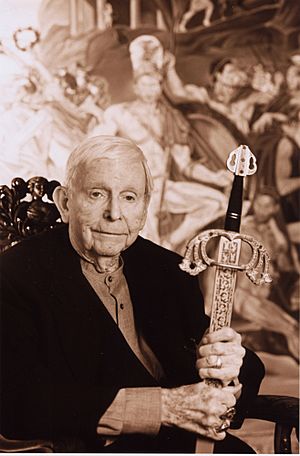Morris Kight facts for kids
Morris Kight (November 19, 1919 – January 19, 2003) was an American who worked hard for gay rights and peace. He is known as one of the first people to start the movement for LGBT civil rights in the United States. He believed everyone should be treated fairly, no matter who they are.
Contents
Morris Kight's Early Life
Morris Kight was born and grew up in Comanche County, Texas. He went to Texas Christian University and finished his studies in 1941. He learned about how to manage people and public services.
From 1941 to 1958, Morris lived in northern New Mexico. While there, he was involved in politics. He helped with Adlai Stevenson's campaign for president in 1952.
Morris also enjoyed acting in Albuquerque. From 1950 to 1955, he was part of local theater groups. Actors from California often visited, bringing new ideas about groups that supported gay people. This was how Morris first learned about organizations like the Mattachine Society.
Fighting for Fairness and Peace
Morris Kight was active in many groups that worked for fairness and peace. In the 1940s, he helped organize workers in the Oil, Chemical and Atomic Workers International Union. He always stood up for people's rights.
Protesting for Change
After moving to Los Angeles, Morris continued his work. He started his own protest group called the "Dow Action Committee" in 1967. This group protested against the Dow Chemical Company. They were concerned about the company's role in making Agent Orange during the Vietnam War.
Morris also led a national boycott against the Coors Brewing Company starting in 1977. He wanted to show how the company used its money to support laws that hurt unions and politicians who were against gay rights. Morris even organized a protest at a festival called Outfest because it accepted money from Coors. He wanted to teach people that some companies try to look good by giving money to gay organizations, but they might not truly support their rights. Because of Morris's efforts, Outfest no longer takes money from Coors.
Leading the Gay Rights Movement
In 1958, Morris Kight moved to Los Angeles. There, he helped start many important organizations for gay and lesbian people.
Key Organizations Morris Kight Founded
One of the first groups he helped create was the "Committee for Homosexual Freedom." This group later changed its name to the Gay Liberation Front (GLF) in October 1969. It was one of the first GLF groups in the country. The name showed support for the Vietnamese National Liberation Front. Soon, there were over 350 GLF groups across the United States.
Morris also helped start the first Christopher Street West gay pride parade in Los Angeles in 1970. He co-founded Aid For AIDS in 1983, which helped people with AIDS. In 1971, he helped create the Gay Community Center, which is now called the Los Angeles Gay and Lesbian Center. He was very proud of creating this center. He also helped start the Stonewall Democratic Club in 1975.
Standing Up to Discrimination
Morris used his experience in protests to fight for gay rights. One famous protest by the LA GLF was against a restaurant called Barney's Beanery. This restaurant in West Hollywood had a sign that said "Fagots [sic] Stay Out." They even printed this saying on matchbook covers.
Morris, along with Troy Perry and 100 other activists, protested outside. They would send people inside to order coffee and take up tables. The owner eventually gave the sign to Morris in front of news cameras. But after the news left, the owner put the sign back up. It stayed there until West Hollywood's first lesbian mayor, Valerie Terrigno, had it removed. This happened when the city passed a law against discrimination. The restaurant's new owner finally apologized in 2005.
National Marches and Recognition
Morris Kight was a leader in the 1987 Second National March on Washington for Lesbian and Gay Rights. He also helped organize the 1988 March on Sacramento for Lesbian and Gay Rights.
For 20 years, he served on the County of Los Angeles Human Relations Commission. This group works to improve human relations in the community.
In 2003, the City of Los Angeles honored Morris Kight. They named the corner of Hollywood Boulevard and McCadden Place "Morris Kight Square." This spot was chosen because it was where the very first street-closing gay pride parade in the world began.
Morris Kight's Later Years
Towards the end of his life, Morris Kight had some strokes that made him slow down.
There is a special Chinese magnolia tree and a bronze plaque dedicated to him. They are located at the Matthew Shepard Triangle in West Hollywood. Morris Kight loved this park and would visit weekly to clean it up and plant new flowers. He encouraged others to do the same.
In November 1998, just before his 79th birthday, the City Council of West Hollywood gave him a Lifetime Achievement Award.
In September 2001, he made a video documentary called "Early Gay and Lesbian History in Los Angeles." In the video, he shared his memories of the Beanery protest and other important actions.
Morris Kight had a longtime companion named Roy Zucheran.
Three days before he passed away, he gave his important papers and items to the National Gay and Lesbian Archives in Los Angeles. UCLA also has some of his historical records.
Morris Kight died peacefully on January 19, 2003, at the Carl Bean Hospice in Los Angeles.
Morris Kight's Legacy
Morris Kight's work continues to inspire people. His video documentary, "Early Gay and Lesbian History in Los Angeles," helps people learn about the past.
The podcast “Making Gay History” has an episode about him. This helps share his story with even more people.
The Chinese magnolia tree and plaque at the Matthew Shepard Triangle in West Hollywood remind everyone of his dedication. Morris Kight's efforts helped make the world a more fair and accepting place for everyone.


